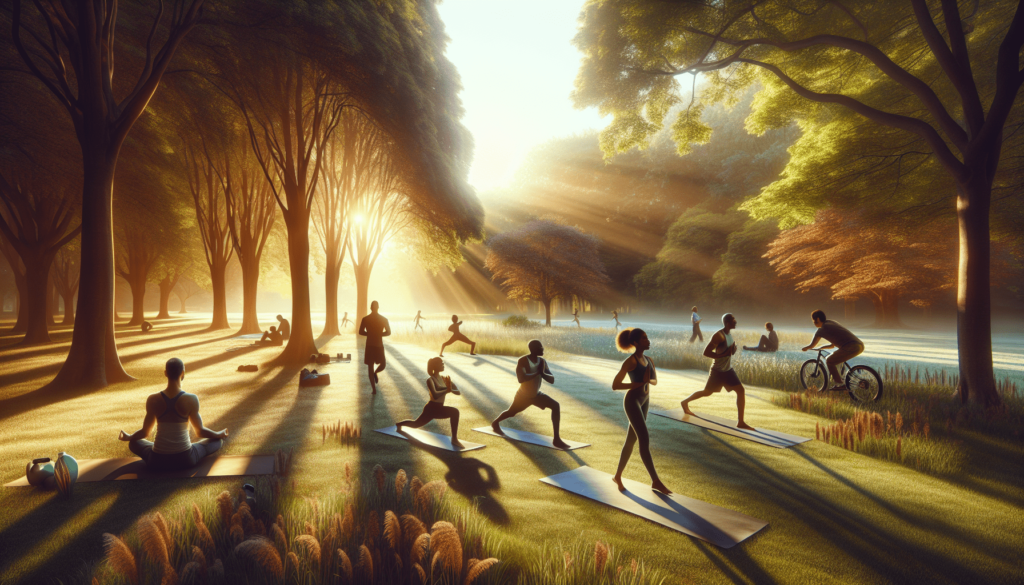Diving into a regular exercise routine is a fantastic way to boost your health and happiness, but deciding on the perfect time to get moving can sometimes feel like a puzzle. Whether you’re an early riser ready to jumpstart your day with energy or someone who prefers to unwind with an evening jog, understanding how different times of day can impact your workout can make all the difference. Let’s explore the pros and cons of various times throughout the day to help you pinpoint the ideal time to lace up your sneakers and hit the gym or the pavement, tailored to your lifestyle and fitness goals. Have you ever wondered if the time of day you choose to exercise could impact the effectiveness of your workout? Whether you’re an early bird catching the sunrise or someone who feels more energized when the sun sets, understanding the best time to exercise can help optimize your workouts and achieve your fitness goals more efficiently.

Choosing the Best Time to Exercise
Deciding on the best time for exercise involves more than just picking a random hour. It’s about syncing your workout with your body’s rhythms, your daily schedule, and the kind of exercise you’re doing.
Understanding Your Body’s Circadian Rhythm
Your body’s internal clock, or circadian rhythm, regulates feelings of sleepiness and wakefulness over a 24-hour period. This rhythm affects your physical performance, hormone levels, and metabolism, all of which play significant roles during exercise.
So, when does your body clock suggest it’s time to lace up your sneakers? Research shows that generally, your body temperature, hormone levels, and energy reserves reach their optimal levels in the early to late afternoon. This could mean that workouts during this time might feel more productive and enjoyable. However, everyone’s circadian rhythm is slightly different, making personal experimentation important.
Lifestyle and Schedule
Let’s be real — the best time to exercise is also about what fits into your daily life. Ask yourself: When can I consistently dedicate time to working out? Am I a morning person or a night owl? Do family or work commitments affect my availability? Finding a consistent time to exercise can matter more than aiming for the biological prime time.
Morning Exercise: Pros and Cons
Rolling out of bed and straight into a workout can have both its advantages and disadvantages. Let’s break them down.
Pros of Morning Workouts
- Boosted Metabolism: Exercising in the morning can increase your metabolism, which means you’ll be burning more calories throughout the day, even while you’re sitting at your desk.
- Consistency: Morning workouts are less likely to be interrupted by daily responsibilities that might pile up as the day progresses.
- Improved Mood: Starting your day with exercise can boost your mood and energy levels, potentially making your day feel smoother and more manageable.
Cons of Morning Workouts
- Time Constraints: If you’re not an early riser, squeezing in a full workout before work or school can feel rushed.
- Physical Performance: Some find that their body and muscles are stiff in the morning, potentially impacting performance and increasing the risk of injury.
Afternoon and Evening Exercise: Pros and Cons
If mornings aren’t your thing, you might find that later in the day your body feels more prepared to engage in physical activity.
Pros of Afternoon/Evening Workouts
- Peak Physical Performance: Studies show that muscle strength, flexibility, and endurance might be higher in the afternoon and evening compared to the morning.
- Higher Pain Tolerance: Your body’s increased core temperature later in the day can lead to a higher pain tolerance and less perceived effort during exercise.
- Stress Relief: Exercise can be an excellent way to decompress after a long day, providing mental health benefits and better sleep.
Cons of Afternoon/Evening Workouts
- Scheduling Conflicts: Work, social gatherings, and family duties can often interfere with afternoon or evening workout routines.
- Sleep Interference: For some, exercising too late in the day may lead to difficulties falling asleep or nighttime restlessness.
Special Considerations
There are a few other factors to consider when determining the best time for you to exercise.
Type of Workout
The type of exercise you engage in could influence your decision on when to workout. For example:
- Strength Training: Since your body temperature is higher later in the day, and muscle function is optimal, afternoon or evening could be the best time for strength training.
- Yoga or Stretching: These can be done effectively at any time of day, but might feel particularly good in the morning to wake up the body.
Personal Goals
Your fitness objectives might also dictate the best time to exercise. If you’re aiming to lose weight, morning workouts on an empty stomach can sometimes accelerate fat loss. However, if building muscle is the goal, later in the day could be optimal due to better protein synthesis and hormonal profiles.
Trial and Error
Ultimately, the best way to determine the ideal time for exercise is through good old trial and error. Monitor how you feel during different times of the day and keep an eye on your performance and progress towards your goals. Listening to your body is key.

Final Thoughts
Finding the right time to exercise is a personal journey that depends on multiple factors, including your body’s circadian rhythms, lifestyle, type of exercise, and personal goals. While the afternoons might offer the best biological conditions for a peak performance, the most important factor is finding a time that fits consistently into your schedule.
Remember, regularity and enjoyment are the most crucial elements of any exercise regime. If you find a time that feels right and allows you to be consistent, that’s likely the best choice for you. No matter when you choose to exercise, the most important thing is that you’re moving and improving your health. Keep experimenting and stick with what works best for you, and don’t be afraid to adjust as your schedule and lifestyle change. Happy exercising!
